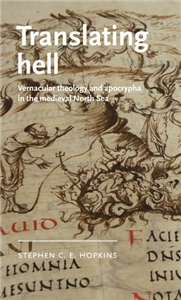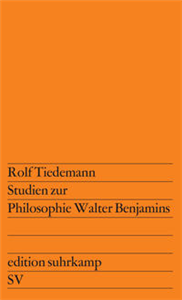Your Search Results
-
Promoted Content
-
Promoted ContentLiterature & Literary StudiesMay 2026
Translating hell
Vernacular theology and apocrypha in the medieval North Sea
by Stephen C. E. Hopkins
In the Middle Ages, hell was useful because it was vaguely defined. Canonical scriptures scarcely mention hell, leaving much to the imaginations of early Christians, who used it to sort out who belonged within the faith. This book explores how hell became a place for literary experiments with local challenges in theology and identity. Following the reception and transformations of two popular hell apocrypha, it argues that they served as this role because of their liminal textual authority. As noncanonical scriptures, apocrypha afforded medieval writers space to revise their hells (since they were not actually scripture), while also encouraging readers to revere those experiments as valid (since they seemed like scripture). The book brings together adaptations from early medieval England, Iceland, Ireland, and Wales, placing the early vernacular theologies of the North Sea in comparative conversation.
-
 Trusted Partner
October 2006
Trusted Partner
October 2006Walter Benjamins Archive
Bilder, Texte und Zeichen
by Erdmut Wizisla, Erdmut Wizisla, Walter Benjamin Archiv, Michael Schwarz, Ursula Marx, Gudrun Schwarz
Von einer Sensation ist zu berichten: Das Walter Benjamin Archiv zeigt eine Fülle von großartigen, in weiten Teilen bisher unpublizierten und auch unbekannten Bildern und Dokumenten. Anläßlich einer Ausstellung in der Akademie der Künste, Berlin, wird, begleitet von einer internationalen Tagung und einer Vielzahl von Veranstaltungen, zum ersten Mal Benjamins Bildund Dingkosmos der Öffentlichkeit vorgestellt. Solche Orientierung an Bildern und Dokumenten, an der Materialität der Gegenstände entspricht auch seinem Werk, das seinerseits ein Reservoir von Texten, Kommentaren, Elementen des Alltags, der Kunst und des Traums ist. Viele dieser Elemente sind als Bausteine in sein 'Passagen'-Projekt eingegangen, das die 'Urgeschichte des 19. Jahrhunderts ' erkundet. Darüber hinaus prägen Techniken des Sammelns und Archivierens die Arbeitsweise Walter Benjamins. Nachdem er aus Deutschland vertrieben worden war, schuf er die Voraussetzungen zur Rettung seiner, wie er sagte, 'unendlich verzettelten Produktion ', indem er Manuskripte, Notizen und Druckbelege bei Freunden in aller Welt deponierte Der reichillustrierte und kommentierte Band schließt erstmals Benjamins Archive auf: Notizhefte, in denen jeder Zentimeter genutzt wird; Register, Verzeichnisse und Karteien, die zugleich akribisch und kreativ geführt sind; Ansichtskarten, von ihm selbst kommentierte Fotoserien; eine Sammlung früher Worte und Sätze seines Sohnes Stefan, dessen Sprach- und Denkentwicklung Benjamin in Aufzeichnungen über Jahre verfolgte.
-
 Trusted Partner
September 2022
Trusted Partner
September 2022Lust
Fuckability, orgasm gap and #metoo
by Henriette Hell
Lust, a mortal sin? These times are over. In today's public perception, it is more likely for a boring sex life to be categorised as that. In statistical terms, people have never had as little sex with each other as they do today. And yet tips for a good sex life are to be found on every (digital) corner. Sex has mutated into a lifestyle product, and terms like 'fuckability' and 'MILF' trip lightly off our tongues. Henriette Hell takes a closer look at the thing about sex. She traces the history and genesis of 'sexual liberation', and sheds light on the 'cheating gene' and the #metoo debate. The author asks (and answers) the question of whether sex is becoming more and more antisocial and what actually still turns us on today. In doing so, she focuses on the former mortal sin of lust, which is inseparably linked to the systematic suppression of female lust (and its liberation).
-
 Trusted Partner
Trusted Partner
-
 Trusted Partner
Trusted Partner
-
 Trusted Partner
Trusted Partner
-
 Trusted Partner
May 2001
Trusted Partner
May 2001Übersetzen: Walter Benjamin
by Christiaan Lucas Hart Nibbrig
In Übersetzen: Walter Benjamm wird anhand einer scheinbar randständigen Frage die intellektuelle Physiognomie Walter Benjamins beleuchtet. Der Band, der, passend zum Thema, einen internationalen Gesprächszusammenhang dokumentiert, gilt Walter Benjamin als Theoretiker des Übersetzens und als Übersetzer, der Schwierigkeit, ihn zu übersetzen, und vor allem auch der Frage des Über-Setzens, Umsetzens und Ersetzens: Grundfiguren seines philosophischen und literarischen Werks, die in solcher Eindringlichkeit erstmals fokussiert in den Blick gerückt und von verschiedenen Seiten aus angegangen werden.
-
 Trusted Partner
March 2005
Trusted Partner
March 2005Walter Benjamin
by Momme Brodersen
Walter Benjamin gehört zu den meistdiskutierten Autoren des 20. Jahrhunderts – in Wissenschaft, Literatur und Kunst. Seine eigenwilligen und unkonventionellen Schriften sind ein unablässiges Nachdenken über seine großstädtische, seine Berliner Herkunft: darüber, wie man sich im Labyrinth ständig wechselnder Eindrücke zurechtfinden kann.
-
 Trusted Partner
Trusted Partner
-
 Trusted Partner
Trusted Partner
-
 Trusted Partner
September 2020
Trusted Partner
September 2020Walter Benjamin
Eine Biographie
by Howard Eiland, Michael W. Jennings, Irmgard Müller, Ulrich Fries
Im ersten Satz erklärt dieses umfassende, facettenreiche Porträt Walter Benjamin zu einem »der wichtigsten Zeugen der europäischen Moderne«. Damit ist das Programm des Buches vorgegeben: Detailliert wird der Zeuge in seinen Suchbewegungen verfolgt, wie er in herausragender und parteiischer Form den Geist seiner Zeit artikuliert, schwankend zwischen Jugendbewegung, Zionismus, Marxismus und Messianismus. Benjamins Hoffnung, einmal »erstrangiger Kritiker der deutschen Literatur« zu werden, erfüllte sich zu Lebzeiten nicht. Subjektive Dispositionen und objektive Verhältnisse drängten diesen Autor zunehmend in eine randständige, wenngleich von Freunden und Bewunderern geachtete Existenz. Wirtschaftliche Not, Verfolgung und Flucht prägten seine letzten Lebensjahre. Die Auseinandersetzungen um die Deutungshoheit über Benjamins Werk (und Leben) setzten bald nach Kriegsende ein: Wer vollstreckte das Testament in seinem Sinne - Theodor W. Adorno oder Hannah Arendt? Gershom Scholem oder die Neomarxisten Berliner Prägung? Oder gar die Studentenbewegung? Die nun endlich in deutscher Sprache vorliegende, vielgerühmte und reich bebilderte Biographie verarbeitet sämtliches verfügbare Material in einer der Objektivität verpflichteten Weise und stellt auch die unterschiedlichen Haltungen zu Benjamin auf den Prüfstand. Sie gilt schon jetzt als Standardwerk.
-
 Trusted Partner
Humanities & Social SciencesApril 2022
Trusted Partner
Humanities & Social SciencesApril 2022Voices from the underworld
by Fabian Graham, Yangwen Zheng, Richard Madsen
-
 Trusted Partner
Humanities & Social SciencesJune 2005
Trusted Partner
Humanities & Social SciencesJune 2005Reading Walter Benjamin
Writing through the catastrophe
by Richard Lane
'Reading Walter Benjamin' explores the persistence of absolute in Benjamin's work by sketching-out the relationship between philosphy and theology apparent in his diverse writings, from the early youth-movement essays to the later books, essays and fragments. The book examines Benjamin from two main perspectives: a history-of-ideas approach situating Benjamin in relation to the new German-Jewish thinking at the turn of the twentieth-century, as well as the German youth movements, Surrealism and the 'Georgekreis'; and a conceptual approach examining more critical issues in relation to Benjamin and Kant, modern aesthetics and narrative order. Chapters cover: 'Kulturpessimismus' and the new thinking; metaphysics of youth: Wyneken and 'Rausch'; history: surreal Messianism; Goethe and the 'Georgekreis'; Kant's experience; casting the work of art; disrupting textual order; and exile and the time of crisis. The book uses new translations of Benjamin's essays, fragments and his 'Arcades Project', and makes substantial reference to previously untranslated material. Lane's text allows the non-specialist entry into complex areas of critical theory, simultaneously offering original readings of Benjamin and twentieth-century arts and literature. ;
-
 Trusted Partner
July 2016
Trusted Partner
July 2016Walter Benjamin – die Geschichte einer Freundschaft
by Gershom Scholem
Gershom Scholems Bericht ist mehr als eine Biographie. Mit teilweise unbekannten Dokumenten belegt, leuchtet der intimste Kenner des Lebens und des Werkes von Walter Benjamin dieses Leben und Werke aus. Die Geschichte der Freundschaft beginnt mit den ersten Berührungen im Jahre 1913 und 1915, sie schildert die Jahre in der Schweiz von 1918 bis 1919, sie schildert Scholems nimmermüde Bemühungen, den Freund nach Jerusalem zu holen, und sie liefert einen bedeutenden Kommentar zu Benjamins marxistischen wie metaphysisch-jüdischen Vorstellungen.
-
 Trusted Partner
July 1973
Trusted Partner
July 1973Studien zur Philosophie Walter Benjamins
Mit einer Vorrede von Theodor W. Adorno
by Rolf Tiedemann, Theodor W. Adorno
1965 zuerst erschienen, blieb das Buch Tiedemanns bis heute die einzige umfassende Darstellung der Philosophie Walter Benjamins; seit längerem vergriffen, wird es jetzt unverändert wieder vorgelegt. Nach Tiedemann untersteht Benjamins Denken, so energisch es den Habitus aller Schulphilosophie abgestreift hat, dennoch einem spezifisch philosophischen Formgesetz. Mit der Einsicht in dieses Formgesetz, das in der Geschichte der Philosophie kaum schon vor Benjamin begegnet, fällt die in den Wahrheitsgehalt des Benjaminschen Werks zusammen. »Während Tiedemann sich auf einige zentrale Komplexe beschränkt und vor dem ominösen Ideal der Vollständigkeit hütet, ist es seiner Konzentration gleichwohl gelungen, die Einheit, den strengen Zusammenhang und die konstitutive Kraft des Benjaminschen Denkens darzutun. Nach dieser Arbeit wird es keinem mehr möglich sein, sich hinter das Argument zu verschanzen, das von Benjamin Inaugurierte sei aperçuhaft oder rhapsodischen Wesens.« »Theodor W. Adorno«
-
 Trusted Partner
Literature & Literary StudiesJanuary 2017
Trusted Partner
Literature & Literary StudiesJanuary 2017Literary and visual Ralegh
by J. B. Lethbridge, Christopher Armitage
-
 Trusted Partner
Literature & Literary StudiesSeptember 2020
Trusted Partner
Literature & Literary StudiesSeptember 2020The early Spenser, 1554–80
'Minde on honour fixed'
by Jean R. Brink, Joshua Samuel Reid
Brink's provocative biography shows that Spenser was not the would-be court poet whom Karl Marx's described as 'Elizabeth's arse-kissing poet'. In this readable and informative account, Spenser is depicted as the protégé of a circle of London clergymen, who expected him to take holy orders. Brink shows that the young Spenser was known to Alexander Nowell, author of Nowell's Catechism and Dean of St. Paul's. Significantly revising the received biography, Brink argues that that it was Harvey alone who orchestrated Familiar Letters (1580). He used this correspondence to further his career and invented the portrait of Spenser as his admiring disciple. Contextualising Spenser's life by comparisons with Shakespeare and Sir Walter Ralegh, Brink shows that Spenser shared with Sir Philip Sidney an allegiance to the early modern chivalric code. His departure for Ireland was a high point, not an exile.
-
 Trusted Partner
The ArtsJanuary 2019
Trusted Partner
The ArtsJanuary 2019Carol Reed
by Peter William Evans
Carol Reed is one of the truly outstanding directors of British cinema, and one whose work is long overdue for reconsideration. This major study ranges over Reed's entire career, combining observation of general trends and patterns with detailed analysis of twenty films, both acknowledged masterpieces and lesser-known works. Evans avoids a simplistic auteurist approach, placing the films in their autobiographical, socio-political and cultural contexts and relating these to the analysis of Reed's art. The critical approach combines psychoanalysis, gender theory, and the analysis of form. Archival research is also relied on to clarify Reed's relations with his creative team, financial backers and others. Films examined include Bank Holiday, A Girl Must Live, Odd Man Out, The Fallen Idol, The Third Man, Night Train to Munich, The Way Ahead, Outcast of the Islands, Trapeze and Oliver!.
-
 Trusted Partner
2019
Trusted Partner
2019Good Evening, Good Night
The cultural history of sleep
by Karoline Walter
What we associate with sleep is shaped by the culture we live in. Whereas the God of the Bible never sleeps, the sinful human falls asleep every night and is thus marked as an inferior being. In the Age of Enlightenment, (too much) sleep was considered a waste of strength, which could otherwise be used to change the world. These days, sleep seems to be subject to the same tenets of usefulness as everything else and is seen to assist with the optimization of one’s self. However, culture and technology also influence how we sleep: for example, the constant availability of light, the modern conditions of work and all sorts of distractions have meant that we no longer follow our natural rhythm – a first sleep before midnight and a second sleep after a longer period of wakefulness, during which we may be active. In “Good Evening, Good Night”, Karoline Walter uses numerous examples from history, literature and research to illustrate how sleep and sleeping have changed across cultures and eras – an entertaining read, certainly nothing to put you to sleep.

























